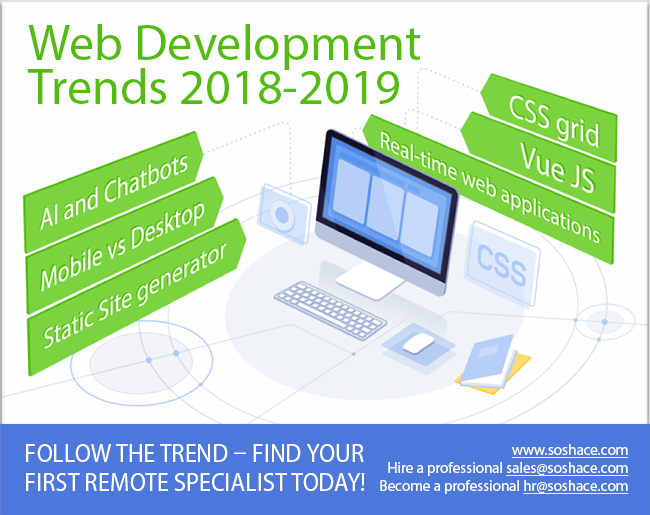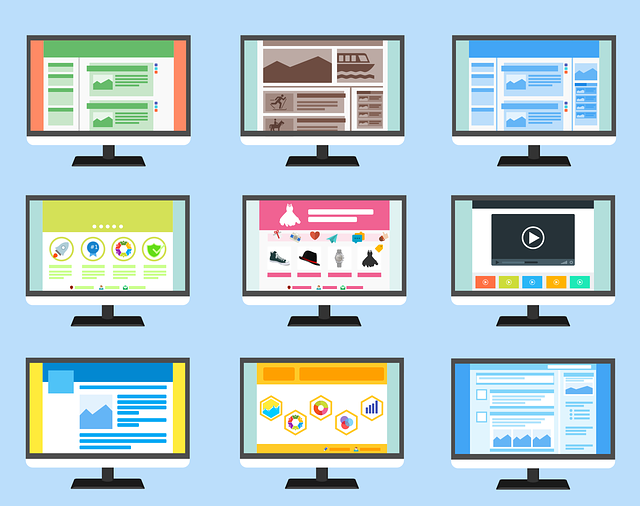Web development and programming is one of the most rapidly changing sphere. For a programmer, web developer or software engineer in order to keep ahead it is important to monitor the сurrent trends and make attempts to look into tomorrow. In this article, we will try to make assessments of the present web development tendencies and try to predict what will become relevant in 2019.
AI and Chatbots
In our previous article (The Future of Recruitment) we touched on the question of the role of Artificial Intelligence in the future of recruitment and today we will consider its role in the web development and chatbots. Nowadays, the cutting-edge chatbots can do nearly everything: resolve serious customer service issues, increase customer loyalty, personalize communication and improve communication with the customers. The chatbot technology is still developing, but more and more people every day communicate with the chatbots and do not even realize it. Chatbots are becoming human-like and more intelligent every day and in 2019 we expect this trend to continue its growth.
What are the web technologies which are mainly being used in the chatbot creation? To create an AI Chatbot a programmer has to be professional at one of the programming languages, like Javascript, Ruby or Python, etc., as well as at Javascript runtime NodeJS (which is also being actively used at producing the mostly human-like chatbots in 2018). Sometimes app developers are using Java for chatbot creation, but this programming language lacks the native support for many platforms. To help a chatbot understand the user messages a programmer needs to use wit.ai by Facebook or api.ai by Google processing services, which are created to transform natural user language into actionable data and can be used for managing conversation flow in a specific way. For the database solutions, we recommend MongoDB, although other databases like MySQL or Postgres also can be effectively used. For hosting a chatbot in 2018 we recommend using AWS or Heroku.
Mobile vs Desktop. Progressive Web Apps
Of course the matter of responsive design is more a web design issue, than a programming one, but we still should include it in our 2018-2019 web development trend and highlight it as a compulsory one, because in the 3rd quarter (2018) 51,89% of the global web traffic originated from mobile devices, which is up from 52,21% of the corresponding quarter of the previous year. To make a website mobile- and tablet-friendly a web developer needs to make a website responsive ( all the information on the website should be accessible on different devices), make information on the mobile and tablet versions of the website easy to find, include Viewport Meta Tag, which is one of the best ways of controlling the website behavior on the mobile devices and informs browsers to fit the width of the page on the device screen ( you need to add the following HTML on each page:<meta name=”viewport” content=”width=device-width, initial-scale=1″>), turn off autocorrect for the forms on the mobile devices (because a user may spend a lot of time entering the data if his/her cell-phone is trying to enter a more common word or phrase for this or that field. Another issue for making your website mobile-friendly is making the buttons sizes and font sizes large enough to click and read on mobile or tablet devices.
A web developer should also remember about compressing images and CSS to make a website speed fast enough, which is crucial and dramatically important for mobile and tablet devices. We also recommend you to allow to think beforehand about an easy way of making switching from mobile to desktop view. And don’t forget to perform a mobile testing on a regular basis. Designing your website we recommend you consider the importance of the mobile version not as a popular trend, but as a must-have trend which any successful business owner and any professional web developer should always keep in mind and follow.
A very important trend and technology that we should mention in the framework of the mobile web development is PWA (Progressive Web Apps), which are using modern capabilities for delivering an app-like experience to users and are working well for every user with any browser, due to the fact that they are being built with progressive enhancement. Progressive Web Apps fit equally good desktop, mobile, tablet screen.
Web components
Let’s come back to the technical programming issues, like web components, which we suggest you consider as reusable widgets for your website, which can be reused as many times as it is possible. Web components let you create reusable customer user interface components with functionalities stored away apart from your code. ReactJS (react.js) and Angular (angular.js) are famous and popular for this so-called component-based programming approach, which will definitely continue to be popular in 2019.
Static Site generator
Such tools, as static site generators, help web developers to generate HTML- only websites. The site generations take place on a development machine or staging server and only after this the newly created HTML files are being deployed to a live web server. Static sites are simple and do not use a database or processing power or server resources.
CSS grid
CSS Grid Layout is the most powerful and developed layout system available in CSS, which can handle both columns and rows by applying CSS rules both to a parent element (The Grid Container) or the children elements (The Grid Items). In 2018 the majority of browsers started to support CSS Grid. We expect this technology to stay real-time in 2019.
Vue JS
Vue JS was launched in 2014 and is becoming more and more popular every year, as long as it is one of the fastest and lightweight libraries for building web interfaces using MVVM data bindings with a very simple API. This framework is not created by a top tech or IT company like Facebook (ReactJS) or Google (AngularJS) and was created by a physical person Evan You.
Real-time web applications
Real-time web applications, which are based on WebSockets and provide users really fast interactions and instant share of information as long as the connection between the client and server is left open and the server provides the new data soon after getting it. With such app architecture, the clients do not need to check manually if the information was updated. This trend is not new for the runtime Node.js, but during the last years, it started to spread to different frameworks and even programming languages. For example, the framework Ruby on Rails, which ignored the rise of Javascript single page apps for many years and relied on server side rendering, launched “The ActionCable”.
We are looking forward to meeting you on our website soshace.com










